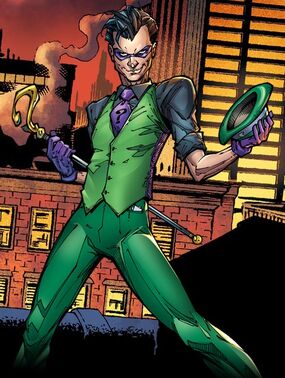Opponents of each side throw out some valid points. A GM that is too adversarial with the players has a tendency to screw over the players with petty rules-lawyering if not all out rule-breaking. The other argument is that if the game master doesn't do something to challenge the players, then it's not really a game but one person telling a story with the players sitting around unable to have any effect on the narrative.
Ideally a GM should challenge the players, while maintaining an even playing field. This seems like it would be easier said than done. Truth be told, there is a model for an adversary that is a threat to his opponents while simultaneously giving them a fair chance to defeat him. And he comes from the world of comics.
 Edward Nygma, aka The Riddler is a classic Batman villain. Physically he's no threat to the Dark Knight. But Riddler stories are never about challenging Batman to a fight. The Riddler doesn't fight Batman, he challenges him.
Edward Nygma, aka The Riddler is a classic Batman villain. Physically he's no threat to the Dark Knight. But Riddler stories are never about challenging Batman to a fight. The Riddler doesn't fight Batman, he challenges him.The Riddler sees himself as the smartest man in the world, there is not a single person that can beat him in a battle of wits. However, he doesn't feel that he gets the recognition that he deserves. Now he could go on Jeopardy, or talk-shows or the public speaker circuit to get the word out about his brilliance, but that won't do for Nygma. He would rather prove his intelligence by pitting himself against The World's Greatest Detective.
Now some would argue that The Riddler is a lame villain because of him lack of physicality and the fact that he "gives away what he's going to do". These people are missing the point. To Riddler, he's not committing a crime as much as he is playing a game with a worth adversary. Yes there are clues left, but those clues are disguised in riddles, puzzles and word-play. They are as much a taunt as they are a clue. Nygma so wants to be recognized that he says, "I am so smart I can blatantly tell you what I am about to do and you still won't be able to stop me." And if he is beaten, as long as his opponent plays by the 'rules' he sets forward for each game, he takes satisfaction in having had a worth opponent.
As a GM, I am the Riddler. I am armed with books of knowledge. I know every nook and cranny of every piece of terrain out there. I know the answers, I make the questions. And I will challenge any player that comes to my table to take me on in a fair game. I won't make things easy. I won't hold your hand. But if you use your head, if you rely upon your brain more than any character sheet or splatbook, you might just be able to beat me.
Riddle me this player, are you game?

All good. Then there are the DM's who have biases against certain players and/or their characters.
ReplyDelete